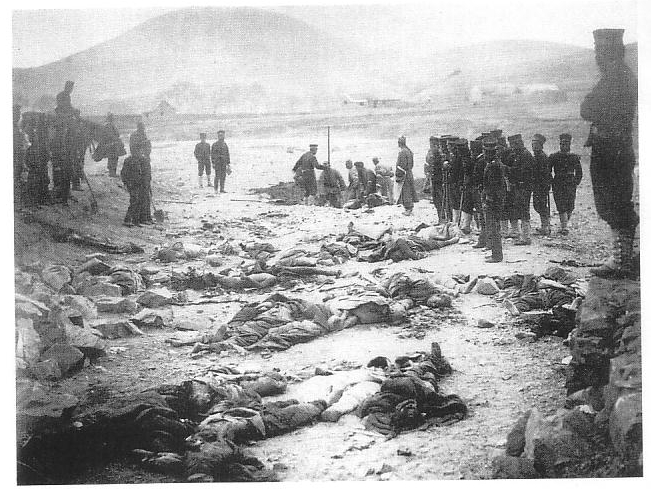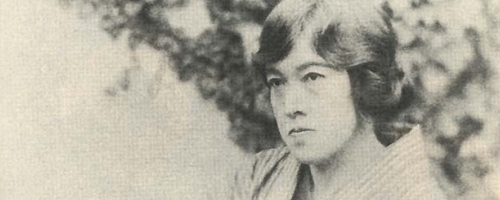君死にたまふことなかれ
旅順口包囲軍の中にある弟を歎きて
与謝野晶子
あゝをとうとよ君を泣く
君死にたまふことなかれ
末に生れし君なれば
親のなさけはまさりしも
親は刃(やいば)をにぎらせて
人を殺せとをしへしや
人を殺して死ねよとて
二十四までをそだてしや
堺の街のあきびと1の
旧家をほこるあるじにて
親の名を継ぐ君なれば
君死にたまふことなかれ
旅順2の城はほろぶとも
ほろびずとても何事か
君知るべきやあきびとの
家のおきてに無かりけり
君死にたまふことなかれ
すめらみこと3は戦ひに
おほみづからは出でまさね
かたみ4に人の血を流し
獣の道に死ねよとは
死ぬるを人のほまれとは
大みこゝろ5の深ければ
もとよりいかで思(おぼ)されむ
あゝをとうとよ戦ひに
君死にたまふことなかれ
すぎにし秋を父ぎみに
おくれたまへる母ぎみは
なげきの中にいたましく
わが子を召され家を守(も)り
安しと聞ける大御代も
母のしら髪はまさりぬる
暖簾(のれん)のかげに伏して泣く
あえかに6わかき新妻を
君わするるや思へるや
十月(とつき)も添はでわかれたる
少女(おとめ)ごころを思ひみよ
この世ひとりの君ならで
あゝまた誰をたのむべき
君死にたまふことなかれ
旅順口包囲軍の中にある弟を歎きて
与謝野晶子
あゝをとうとよ君を泣く
君死にたまふことなかれ
末に生れし君なれば
親のなさけはまさりしも
親は刃(やいば)をにぎらせて
人を殺せとをしへしや
人を殺して死ねよとて
二十四までをそだてしや
堺の街のあきびと1の
旧家をほこるあるじにて
親の名を継ぐ君なれば
君死にたまふことなかれ
旅順2の城はほろぶとも
ほろびずとても何事か
君知るべきやあきびとの
家のおきてに無かりけり
君死にたまふことなかれ
すめらみこと3は戦ひに
おほみづからは出でまさね
かたみ4に人の血を流し
獣の道に死ねよとは
死ぬるを人のほまれとは
大みこゝろ5の深ければ
もとよりいかで思(おぼ)されむ
あゝをとうとよ戦ひに
君死にたまふことなかれ
すぎにし秋を父ぎみに
おくれたまへる母ぎみは
なげきの中にいたましく
わが子を召され家を守(も)り
安しと聞ける大御代も
母のしら髪はまさりぬる
暖簾(のれん)のかげに伏して泣く
あえかに6わかき新妻を
君わするるや思へるや
十月(とつき)も添はでわかれたる
少女(おとめ)ごころを思ひみよ
この世ひとりの君ならで
あゝまた誰をたのむべき
君死にたまふことなかれ
-1904年『明星』9月号に掲載
Le note originali giapponesi
Japanese original notes
注釈:
1 あきびと=商人
2 旅順=遼東半島南端にある軍港。 ロシアの東洋艦隊の基地で要塞が築かれていた。
3 すめらみこと=天皇
4 かたみに=たがいに
5 大みこゝろ=天皇のこころ
6 あえかに=かよわく
Japanese original notes
注釈:
1 あきびと=商人
2 旅順=遼東半島南端にある軍港。 ロシアの東洋艦隊の基地で要塞が築かれていた。
3 すめらみこと=天皇
4 かたみに=たがいに
5 大みこゝろ=天皇のこころ
6 あえかに=かよわく
inviata da Riccardo Venturi - 20/8/2013 - 17:10
Lingua: Inglese
La versione inglese.
English Translation

English Translation

Port Arthur, 1904/05.
Le note alla traduzione contenute nella pagina di provenienza sono state fedelmente riprodotte. L'autore della traduzione non è indicato.
PRITHEE DO NOT DIE
Lamenting my younger brother in combat as one
of the troops besieged at Lüshun(Port Arthur)
Yosano Akiko
Oh, younger brother mine, for thee I weep,
Prithee do not die,
For you were born the very last,
And our parents loved you all the more,
Yet they made thee grasp a blade in hand,
Taught thee kill a man you shall,
Kill a man, and die you too,
groomed you thus to age twenty-four.
Master now of the proud old house,
The merchant-house of Sakai1, our town,
You must now carry on our name,
So I prithee, do not die,
Though Lüshun's2 fortress should perish,
Should it be saved, what of that?
Thou ought know, it nowhere commands
On the familial codes3 of our merchant house.
I prithee do not die,
The Heavenly-Prince does not himself
Lead by his own august presence his troop to battle.
For to command that men shed blood of men,
And die following the beastly path4,
And tell us death be the glory of men,
If his Highness' heart be compassionate,
How could he truly think it so?
Oh young brother mine in battle,
I prithee you mustn't die.
Our mother who has lagged behind father
In the passing of the autumn years of life,
It sores me to watch her lament,
Deprived of son to guard the home,
And though she hears our Highness hale and safe,
Our mother's gray hair grows.
Stooping in the shade of the noren5 she weeps,
The frail young wife of yours,
Or have you forgotten? Or do you think of her?
Think on her maidenly feeling,
Together ere ten months, then parted,
And there's none another the likes of you,
Oh once again I ask,
Prithee do not die.
Lamenting my younger brother in combat as one
of the troops besieged at Lüshun(Port Arthur)
Yosano Akiko
Oh, younger brother mine, for thee I weep,
Prithee do not die,
For you were born the very last,
And our parents loved you all the more,
Yet they made thee grasp a blade in hand,
Taught thee kill a man you shall,
Kill a man, and die you too,
groomed you thus to age twenty-four.
Master now of the proud old house,
The merchant-house of Sakai1, our town,
You must now carry on our name,
So I prithee, do not die,
Though Lüshun's2 fortress should perish,
Should it be saved, what of that?
Thou ought know, it nowhere commands
On the familial codes3 of our merchant house.
I prithee do not die,
The Heavenly-Prince does not himself
Lead by his own august presence his troop to battle.
For to command that men shed blood of men,
And die following the beastly path4,
And tell us death be the glory of men,
If his Highness' heart be compassionate,
How could he truly think it so?
Oh young brother mine in battle,
I prithee you mustn't die.
Our mother who has lagged behind father
In the passing of the autumn years of life,
It sores me to watch her lament,
Deprived of son to guard the home,
And though she hears our Highness hale and safe,
Our mother's gray hair grows.
Stooping in the shade of the noren5 she weeps,
The frail young wife of yours,
Or have you forgotten? Or do you think of her?
Think on her maidenly feeling,
Together ere ten months, then parted,
And there's none another the likes of you,
Oh once again I ask,
Prithee do not die.
— pub. in Myōjō Sept. 1904.
Translation's Notes / Note alla traduzione
Notes:
1 Sakai is a merchant town with a rich history, which prospered by foreign trade in the age of Warring-States, and its merchants were proud and independent-minded. The famous tea ceremony master Sen-no-Rikyū (1522-1591) who committed harakiri was a Sakai merchant.
2 Lüshun (Port Arthur), pronounced "Ryojun" in Japanese, was a naval port for Russia's Eastern Fleet.
3 An "old family" often has something called kakun or lessons — do's and don'ts that are passed down generation to generation. The poetess is saying that since they are merchant family, dying to defend a castle is certainly not one of those lessons.
4 "Beastly path" is a reference to a course of conduct without morality or discipline; In Buddhism, if your conduct in this life is poor, you are said to be relegated to chikushōdō "way of beasts" in the next life.
5 Noren is the shop curtain, the drape of cloth hanging at the shop entrance. There is also such a curtain between the storefront and the back area.
Notes:
1 Sakai is a merchant town with a rich history, which prospered by foreign trade in the age of Warring-States, and its merchants were proud and independent-minded. The famous tea ceremony master Sen-no-Rikyū (1522-1591) who committed harakiri was a Sakai merchant.
2 Lüshun (Port Arthur), pronounced "Ryojun" in Japanese, was a naval port for Russia's Eastern Fleet.
3 An "old family" often has something called kakun or lessons — do's and don'ts that are passed down generation to generation. The poetess is saying that since they are merchant family, dying to defend a castle is certainly not one of those lessons.
4 "Beastly path" is a reference to a course of conduct without morality or discipline; In Buddhism, if your conduct in this life is poor, you are said to be relegated to chikushōdō "way of beasts" in the next life.
5 Noren is the shop curtain, the drape of cloth hanging at the shop entrance. There is also such a curtain between the storefront and the back area.
inviata da Riccardo Venturi - 20/8/2013 - 18:14
Lingua: Italiano
Traduzione italiana di Riccardo Venturi
(Dalla versione inglese)
22 agosto 2013

(Dalla versione inglese)
22 agosto 2013

Un'altra immagine di Akiko Yosano.
TI PREGO, NON MORIRE
Lamento per mio fratello minore che
combatte nelle truppe stanziate a Lüshun (Port Arthur)
Yosano Akiko
Oh, fratello mio, per te io piango,
ti prego, non morire
perché sei nato per ultimo,
e sei tu quello che i nostri genitori più amavano.
Eppure ti hanno fatto prendere una spada in mano
e insegnato che devi uccidere un uomo,
uccidere un uomo, e anche te morire
e così ti hanno addestrato a ventiquattro anni.
Padrone ora della fiera e vecchia casa,
la casa mercantile di Sakai [[|1]], la nostra città,
tu devi perpetuare il nostro nome
e quindi, ti prego, non morire.
Anche se la fortezza di Lüshun [[|2]] andasse perduta,
dovrebbe forse salvarsi?
Devi sapere che in nessun luogo essa presiede
ai codici familiari [[|3]] della nostra casa.
Ti prego, non morire,
neanche l'Imperatore guida le sue truppe
alla battaglia con la sua augusta presenza.
Comandare che uomini versino il sangue di altri uomini,
morire seguendo il cammino bestiale [[|4]],
dirci che la morte è gloriosa per gli uomini:
se il cuore di Sua Altezza Imperiale avesse pietà,
come potrebbe veramente pensare queste cose?
Diletto fratello minore in guerra,
ti prego, non morire.
Nostra madre, sopravvissuta a nostro padre
mentre scorrono gli anni dell'autunno della sua vita,
mi fa male guardarla lamentarsi,
privata di suo figlio, custodia della casa.
E anche se sente che Sua Altezza è sano e al sicuro
le crescono i capelli bianchi.
Curva all'ombra del noren [[|5]] piange
la tua delicata e giovane moglie,
la hai scordata? Pensi a lei?
Pensi ai suoi sentimenti di ragazza,
prima insieme per dieci mesi, poi separati
e non c'è nessuno uguale a te.
Oh, ancora una volta ti chiedo,
ti prego, fratello, non morire.
Lamento per mio fratello minore che
combatte nelle truppe stanziate a Lüshun (Port Arthur)
Yosano Akiko
Oh, fratello mio, per te io piango,
ti prego, non morire
perché sei nato per ultimo,
e sei tu quello che i nostri genitori più amavano.
Eppure ti hanno fatto prendere una spada in mano
e insegnato che devi uccidere un uomo,
uccidere un uomo, e anche te morire
e così ti hanno addestrato a ventiquattro anni.
Padrone ora della fiera e vecchia casa,
la casa mercantile di Sakai [[|1]], la nostra città,
tu devi perpetuare il nostro nome
e quindi, ti prego, non morire.
Anche se la fortezza di Lüshun [[|2]] andasse perduta,
dovrebbe forse salvarsi?
Devi sapere che in nessun luogo essa presiede
ai codici familiari [[|3]] della nostra casa.
Ti prego, non morire,
neanche l'Imperatore guida le sue truppe
alla battaglia con la sua augusta presenza.
Comandare che uomini versino il sangue di altri uomini,
morire seguendo il cammino bestiale [[|4]],
dirci che la morte è gloriosa per gli uomini:
se il cuore di Sua Altezza Imperiale avesse pietà,
come potrebbe veramente pensare queste cose?
Diletto fratello minore in guerra,
ti prego, non morire.
Nostra madre, sopravvissuta a nostro padre
mentre scorrono gli anni dell'autunno della sua vita,
mi fa male guardarla lamentarsi,
privata di suo figlio, custodia della casa.
E anche se sente che Sua Altezza è sano e al sicuro
le crescono i capelli bianchi.
Curva all'ombra del noren [[|5]] piange
la tua delicata e giovane moglie,
la hai scordata? Pensi a lei?
Pensi ai suoi sentimenti di ragazza,
prima insieme per dieci mesi, poi separati
e non c'è nessuno uguale a te.
Oh, ancora una volta ti chiedo,
ti prego, fratello, non morire.
×
![]()



[1904]
Poesia di Akiko Yosano
A Poem by Akiko Yosano
Musica di [ ] ?
Music by [ ] ?
Nata come Sho Ho il 7 dicembre 1878 nel villaggio di Sakai, presso Osaka, Akiko Yosano (assunse tale nome col matrimonio) è stata una delle più famose e controverse poetesse giapponesi della prima parte del '900. E' considerata una delle prime pacifiste e femministe attive nel Giappone dell'epoca Meiji: il suo anno cruciale può essere considerato il 1901. In quell'anno, all'età di 23 anni, sposò infatti il responsabile editoriale della rivista Myōjō (“Stella lucente”), Tekkan Yosano, sulla quale aveva cominciato a pubblicare le proprie poesie; lo stesso Tekkan Yosano era stato il suo insegnante di poesia tanka. Tekkan era regolarmente sposato: divorziò dalla prima moglie per sposare Akiko, ma in pieno accordo con essa continuò a frequentarla in libero amore. Nello stesso anno, Akiko Yosano pubblicò Midaregami (“Capelli arruffati”), una raccolta di 400 poesie ritenuta il faro del libero pensiero nel Giappone dell'epoca; come è lecito attendersi, la critica ufficiale stroncò la raccolta e la definì scandalosa. Nonostante tutto ciò, Midaregami riscosse un successo clamoroso, e la fama di Akiko Yosano eclissò quella del marito, anch'egli comunque valente poeta. Akiko Yosano morì d'infarto il 29 maggio 1942, in piena guerra; la notizia della sua morte fu fatta passare del tutto inosservata, dopo che per tutta la vita si era spesa contro il crescente militarismo giapponese ed aveva combattuto per le condizioni delle donne in una società del tutto oppressiva nei loro confronti. Le sue opere non erano state messe al bando, ma comunque ignorate; solo negli ultimi due decenni è stata riscoperta, tornando a godere del successo di una volta.
Nel 1904, Akiko Yosano scrisse e pubblicò quella che è probabilmente la sua più celebre poesia, Kimi shinitamou koto nakare (“Ti prego, fratello, non morire”). Suo fratello minore, Chuzaburo, era stato mobilitato per la guerra russo-giapponese (che si concluse con la famosa disfatta russa di Port Arthur, o Lüshun); nella poesia, Akiko espresse tutte le sue preoccupazioni. Musicata poco tempo dopo, la poesia è diventata una delle più classiche canzoni contro la guerra in lingua giapponese, dato che così è sentita da tutti nonostante sia molto “lieve” e non contenga espressioni antimilitariste. In particolare, la poesia fu pubblicata su Myōjō proprio quando il numero delle vittime della battaglia di Port Arthur fu reso noto pubblicamente, ed il carattere antibellico della composizione risultò chiaro. Va da sé che piovvero le accuse di disfattismo sulla poetessa. Non sono purtroppo riuscito a determinare chi sia stato l'autore della musica, ed è possibile anche che esistano più versioni musicate della poesia (che in Giappone è davvero famosissima: è arrivata, manco a dirlo, anche alle sigle dei cartoni animati). Il testo giapponese, le note originali e tradotte e la traduzione inglese le ho trovate invece su questa pagina, e così le riproduco. [RV]